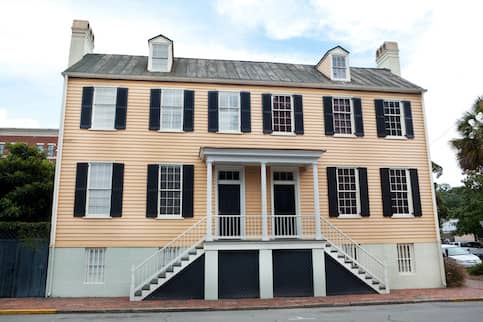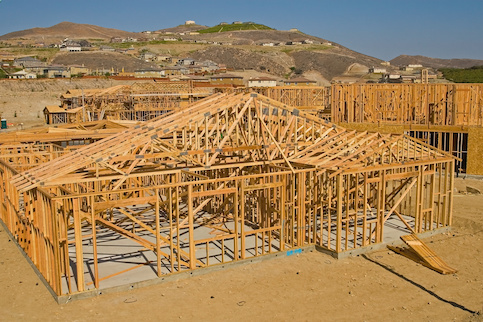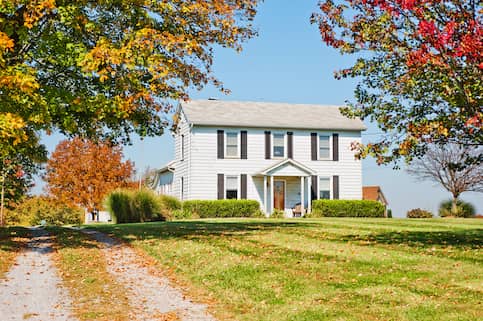With a Federal Housing Administration (FHA) loan, you can purchase a property with a lower credit score and down payment requirements, saving you money upfront. Naturally, if you want to get into real estate investing or purchase a large, multiunit property, you might want to take advantage of an FHA loan’s flexible credit requirements.
FHA restrictions and different definitions of “multifamily home” may make this financing option somewhat complicated for an investor. But under the right circumstances, an FHA multifamily loan may be useful. Let’s break down how an FHA multifamily loan works, review the definition of a multifamily home and explore alternative financing options.
Key Takeaways:
- A FHA multifamily loan allows you to buy a property with up to four units, as long as one unit is your primary residence.
- These loans sometimes offer flexibility when it comes to credit scores and down payments, but they have strict appraisal standards.
- If you want to purchase a multifamily home but don’t want it to be your primary residence, a conventional, jumbo or commercial loan may be a better option.
Can You Buy A Multifamily Home With An FHA Loan?
Can you get an FHA apartment loan to buy a multifamily residence? You can and you can’t – it depends on the definition of a multifamily home.
An FHA loan is typically used to purchase a primary residence where the owner intends to live for most of the year. Generally, the FHA backs funding only for properties that fit the definition of a single-family home.
For the purposes of determining eligibility for single-family home loans (like FHA loans), it’s important to note that the U.S. Department of Housing and Urban Development (HUD) includes dwellings with one to four units as single-family dwellings. Before you decide to take out an FHA loan to buy your multifamily residence, you should understand a few key points.
One of these is the FHA three- and four-unit rule, also known as the FHA self-sufficiency test. If you intend to take out an FHA loan to buy a property with either three or four units, the Federal Housing Administration will want to make sure your rental business will be self-sustaining.
The property passes the self-sufficiency test if 75% of your monthly rental income is enough to cover the principal, interest, taxes and insurance (PITI) of the mortgage each month.
Similar to conventional loans, FHA loans for multifamily properties often have loan terms from 30 to 35 years. This term splits payments into more affordable increments, which means it may be easier than you think to pass the self-sufficiency test.
For example, imagine you want to take out an FHA loan to buy a multifamily home. You pick out a four-unit complex and find out that your total mortgage payment (including PITI) will be $4,000 per month. You plan to live in one of the four units and rent out the other three.
After doing some market research, you decide on a rental rate of $1,800 per unit. This brings your total projected rental income to $5,400 per month.
Now, you must make sure 75% of your rental income will be sufficient to pay your mortgage. Seventy-five percent of $5,400 is $4,050, which is greater than your total monthly mortgage payment of $4,000, so you pass the test.
Given the high cost of housing, more buyers are discovering the benefits of “house hacking,” or finding ways to generate passive income from their primary residence. For many, buying a multifamily home is an appealing way to house hack. It creates income, but it doesn’t come with the same safety and privacy concerns as renting out a room in a single-family home.
What’s Your Goal?
Buy A Home
Discover mortgage options that fit your unique financial needs.

Refinance
Refinance your mortgage to have more money for what matters.
Tap Into Equity
Use your home’s equity and unlock cash to achieve your goals.
The Pros And Cons Of Using FHA Loans To Buy Multifamily Homes
Using an FHA loan to purchase a multifamily home with up to four units may benefit prospective home buyers, but they should weigh the pros and cons.
The Pros And Cons Of Using FHA Loans
To Buy Multifamily Homes
| Pros | Cons |
|---|---|
| Easier to get approved: Because FHA loans are backed by the U.S. government, lenders are more willing to provide loans to home buyers who would have struggled to meet conventional mortgage requirements due to past credit issues. | Mortgage insurance premium (MIP): FHA loans require borrowers to pay a one-time, upfront MIP and an annual MIP, which adds to the long-term cost of borrowing. |
| Lower credit score requirements: FHA loans require a 580 credit score or at least a credit score of 500 if you can make a 10% down payment. The FHA credit score requirement is much lower than the minimum 620 credit score requirement for a conventional loan. | Tougher appraisal process: A lender usually requires an appraisal before you can buy a home. With FHA loans, you must use an FHA-approved appraiser. FHA-approved appraisers are harder to find, and the standards for FHA appraisals are typically more stringent than conventional mortgage appraisals. |
| Lower down payment: FHA loans allow you to make a 3.5% down payment, and you may qualify for down payment assistance programs from your state housing financing agency. | Higher interest rates: FHA loans offer competitive interest rates for your credit score, but the rates may be higher than conventional loan rates for borrowers with higher credit scores. |
| Open to all applicants: Department of Veterans Affairs (VA) loans require proof of military service. U.S. Department of Agriculture (USDA) loans require borrowers to purchase homes only in eligible rural areas. FHA loans, however, are open to all borrowers, including borrowers who want to buy a home in cities and rural areas. |
Ready To Become A Homeowner?
Get matched with a lender that can help you find the right mortgage.
FHA Loan Limits
Financing any kind of real estate can be complicated, but FHA multifamily financing can be especially so. One complicating factor is that FHA loans limit the amount of money you can borrow.
When taking out an FHA loan, duplex/triplex loan limits will generally be higher than limits for one-unit residences. FHA multifamily lending limits are determined by the county where a property is located. When setting these limits, the FHA divides counties into two categories, low-cost and high-cost.
For 2025, the FHA classifies counties as low-cost or high-cost as follows:
- Low-cost: Median housing price multiplied by 115% is less than $524,225
- High-cost:Median housing price multiplied by 115% is more than $524,225
If you want to buy a property in Alaska, Hawaii, Guam or the U.S. Virgin Islands with an FHA loan, multiunit and single-unit loan limits will be even higher. The FHA says that these increased limits are intended to offset the high cost of construction in these areas.
Here’s a look at the FHA loan limits for 2025:
FHA Loan Limits
| Home Size | Low-Cost County | High-Cost County | Alaska, Hawaii, Guam or U.S. Virgin Islands |
|---|---|---|---|
| One unit | $524,225 | $1,209,750 | $1,814,625 |
| Two units | $671,200 | $1,548,975 | $2,323,450 |
| Three units | $811,275 | $1,872,225 | $2,808,325 |
| Four units | $1,008,300 | $2,095,200 | $3,490,300 |
The limits for conventional loans are higher. For example, in a low-cost county, the conventional loan limit ranges from $806,500 for a one-unit home to $1,551,250 for a four-unit home.
In high-cost counties, the FHA loan limits are the same as the conventional loan limits, but the property values are higher, so borrowers may need to save for a larger down payment or borrow more money to purchase a home.
FHA Multifamily Loan Requirements
FHA multifamily loan guidelines are fairly strict. While you can secure a loan with a credit score as low as 500, a higher score will typically lead to a smaller down payment and lower interest rate.
To get an FHA 4-unit (or below) loan in 2025, you must meet the following requirements:
- 10% down payment with a FICO® score of 500 – 579
- 3.5% down payment with a FICO® score higher than 580
- A debt-to-income ratio of less than 43%
- Make one unit your primary residence for at least a year
- A 1.75% MIP upfront
- An annual MIP between 0.15% and 0.75% of the loan balance
- Property must pass an FHA appraisal
It’s worth noting that if you have very good credit or can demonstrate significant cash reserves, you may still be able to secure a loan with a debt-to-income ratio over 43%.
There are a couple of requirements that only apply to three- and four-unit properties:
- You must have at least a three-month cash reserve.
- The property must pass the self-sufficiency test.
When setting your budget, don’t forget about other important expenses:
- Closing costs (about 2% – 6% of purchase price)
- Origination fees (usually about 1% of the loan amount)
Buyers typically pay for the required FHA appraisal of the home. However, the cost of the appraisal is usually rolled into the closing costs.
As with any other kind of mortgage, different lenders offer different rates. The FHA doesn’t directly lend money. Instead, it guarantees loans from approved private lenders. Taking the time to shop around for a good rate could save you thousands in the long run.
Take The First Step To Buying A Home
Find a lender that will work with your unique financial situation.
FHA Multifamily Loans For Real Estate Investors
If you’re a real estate investor, you might be wondering: Can you buy a multifamily home with an FHA loan?
Real estate investors can’t purchase a multifamily home with an FHA loan if the property has five or more units. But HUD, which oversees the FHA, allows the FHA to insure mortgage loans for the following for-profit and nonprofit multifamily properties:
- Healthcare facilities: The FHA insures financing and refinancing for healthcare facility projects under Sections 232 and 242 of the HUD National Housing Act. FHA healthcare loan programs expand access to affordable public healthcare and support HUD’s community development mission.
- Existing multifamily rental housing: Sections 207 and 223(f) can be used to finance the purchase or refinancing of multifamily rental housing. A property that needs substantial renovation won’t qualify for this financing, and HUD won’t approve the mortgage until the critical repairs are complete.
- Rental and co-op housing: The FHA will insure mortgages for the construction or rehabilitation of rental and co-op housing made available to moderate-income families, older adults and people with disabilities.
- Housing for older adults: Section 202 helps finance the purchase or refinancing of properties used to provide affordable housing for lower-income older adults. Properties can be financed with or without renovations. Only nonprofits are eligible to apply.
- Housing for people with disabilities: Section 811 provides financing to purchase rental housing for lower-income people with disabilities. The program also offers rental assistance to state housing agencies to keep costs low for tenants. Only nonprofits are eligible to apply.
Unless you’ve invested in rental properties before, navigating all of these options can be overwhelming. A real estate agent experienced with different types of investment properties can help you understand your options and choose the one that’s right for you.
Alternative Multifamily Mortgage Options
FHA loans aren’t the only option for real estate investors. If you want to purchase a rental property with five units or more (or you don’t want to make your new investment property your primary residence), these options may be preferable:
- Conventional loan: Aconventional loan is a loan offered by a private lender and not backed by any government agency. These loans often have lower interest rates than FHA loans. However, they often have more stringent credit requirements, and they typically require a down payment of 15% – 30%. The good news is that with a high enough down payment, you can avoid having to get private mortgage insurance (PMI).
- Jumbo loan: As the name suggests, a jumbo loan can finance a real estate purchase that exceeds your area’s loan limits. While these loans may help you finance a property you otherwise couldn’t, they often require a larger down payment and come with a higher interest rate. As a result, they may cost substantially more in the long run. Jumbo loans usually have higher credit score requirements than most mortgages.
- Commercial loan: If you want to invest in non-residential real estate (like a physical storefront or office building), a commercial loan might be a better choice. Because repaying a commercial loan often depends on the profits generated, commercial loans pose a greater risk to lenders. As a result, they usually come with high interest rates.
Before buying a multifamily property, it’s essential to carefully consider all financing options. Depending on the route you choose, you could be locked into a mortgage for decades.
FAQ About FHA Multifamily Loans
Have more questions about FHA multifamily loans? We have answers.
The Bottom Line
Typically, only owner-occupied investment properties qualify for an FHA loan. You can purchase a larger property with five or more units using FHA multifamily financing as long as the purchase qualifies under the FHA’s exceptions to the owner-occupied rule. If the property you’re interested in meets FHA multifamily requirements, you may qualify for financing. Otherwise, you may need to consider alternative loan options or a smaller property.
If you’re considering an FHA loan, taking a little time to compare rates can make a big difference. Quicken Loans can match you with lenders so you can choose the best mortgage option for your situation. Contact us today to get started.

Ben Shapiro
Ben Shapiro is an award-winning financial analyst with nearly a decade of experience working in corporate finance in big banks, small-to-medium-size businesses, and mortgage finance. His expertise includes strategic application of macroeconomic analysis, financial data analysis, financial forecasting and strategic scenario planning. For the past four years, he has focused on the mortgage industry, applying economics to forecasting and strategic decision-making at Quicken Loans. Ben earned a bachelor’s degree in business with a minor in economics from California State University, Northridge, graduating cum laude and with honors. He also served as an officer in an allied military for five years, responsible for the welfare of 300 soldiers and eight direct reports before age 25.












